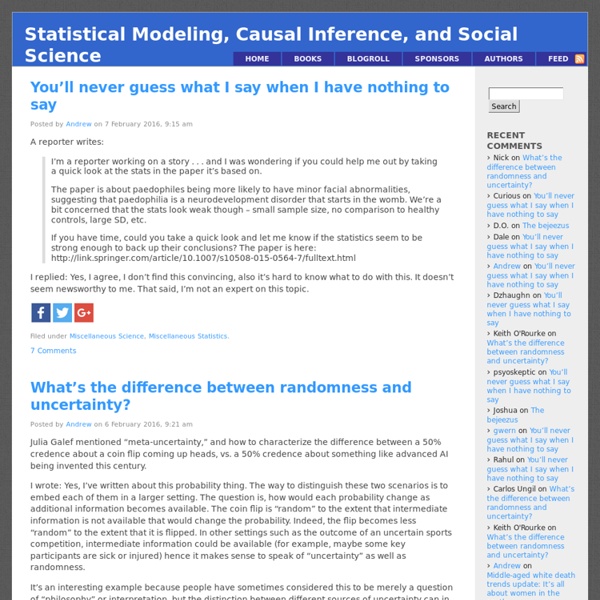



Susan Holmes- Stanford University Probabilty by Surprise Experimenting Paradoxes - Applets Visualizing Probabilities - Applets Beware, the current versions are very sensitive to which browsers you use, see the instructions. The Class Notes This contains all the class notes for the Introduction to Probability class currently taught at Stanford using these, and other web-resources. Social Science Statistics Blog 28 April 2013 App Stats: Roberts, Stewart, and Tingley on "Topic models for open ended survey responses with applications to experiments" We hope you can join us this Wednesday, May 1, 2013 for the Applied Statistics Workshop. Molly Roberts, Brandon Stewart, and Dustin Tingley, all from the Department of Government at Harvard University, will give a presentation entitled "Topic models for open ended survey responses with applications to experiments". A light lunch will be served at 12 pm and the talk will begin at 12.15. "Topic models for open ended survey responses with applications to experiments" Molly Roberts, Brandon Stewart, and Dustin Tingley Government Department, Harvard University CGIS K354 (1737 Cambridge St.)
RStudio in the cloud, for dummies You can have your own cloud computing version of R, complete with RStudio. Why should you? It's cool! Plus, there's a lot more power out there than you can easily get on your own hardware. And, it's R in a web page. Run it from your tablet. Andrew Gelman, Department of Statistics and Department of Political Science, Columbia University Andrew Gelman is a professor of statistics and political science and director of the Applied Statistics Center at Columbia University. He has received the Outstanding Statistical Application award from the American Statistical Association, the award for best article published in the American Political Science Review, and the Council of Presidents of Statistical Societies award for outstanding contributions by a person under the age of 40. His books include Bayesian Data Analysis (with John Carlin, Hal Stern, David Dunson, Aki Vehtari, and Don Rubin), Teaching Statistics: A Bag of Tricks (with Deb Nolan), Data Analysis Using Regression and Multilevel/Hierarchical Models (with Jennifer Hill), Red State, Blue State, Rich State, Poor State: Why Americans Vote the Way They Do (with David Park, Boris Shor, and Jeronimo Cortina), and A Quantitative Tour of the Social Sciences (co-edited with Jeronimo Cortina).
Virtual Laboratories in Probability and Statistics Welcome! Random (formerly Virtual Laboratories in Probability and Statistics) is a website devoted to probability, mathematical statistics, and stochastic processes, and is intended for teachers and students of these subjects. The site consists of an integrated set of components that includes expository text, interactive web apps, data sets, biographical sketches, and an object library. Please read the Introduction for more information about the content, structure, mathematical prerequisites, technologies, and organization of the project. Random is hosted at two sites: www.math.uah.edu/stat/ and www.randomservices.org/stat/.
Everyday Sociology Blog By Karen Sternheimer As a self-starter, I like self-help books, and have read or listened to number of audio books in the genre. I have listened to many books on discovering one’s passions and creativity, on personal finance, relationships, career building, and those promoting emotional well-being. R: Retrieving information from google using the RCurl package « "R" you ready? R: Retrieving information from google using the RCurl package 01Jan09 Lately I read the article Automatic Meaning Discovery Using Google by Cilibras and VitanyiIt which introduces the normalized google distance (NGD) as a measure of semantic relatedness of two search terms. As its basis for calculation the NGD uses simple google search result counts.
“Statistical Science and Philosophy of Science: where should they meet?” Four score years ago (!) we held the conference “Statistical Science and Philosophy of Science: Where Do (Should) They meet?” at the London School of Economics, Center for the Philosophy of Natural and Social Science, CPNSS, where I’m visiting professor [1] Many of the discussions on this blog grew out of contributions from the conference, and conversations initiated soon after.
Cyborgology On Pharrell’s “Happy” by robinjames, 2 days ago at 05:00 am I find Pharrell’s massive hit “Happy” really, really irritating. And, for that reason, I love it.